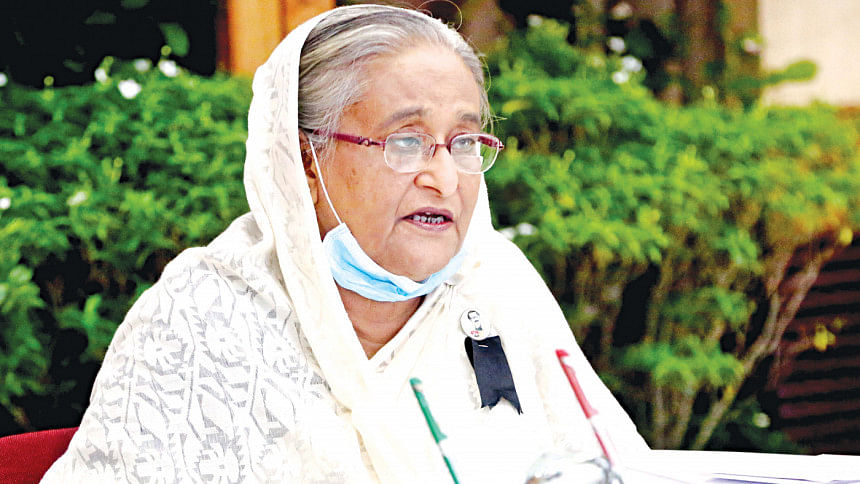Promotion of Students to Higher Grade: PM hints at no exams this year

"There will be no exams … we are thinking about what more we can do. Maybe we can promote without an exam." - Prime Minister Sheikh Hasina
This year's Junior School Certificate and its equivalent exams were cancelled yesterday while Prime Minister Sheikh Hasina hinted that students might be promoted without having to sit for class final tests.
The move comes after the government cancelled Primary Education Completion Examination (PECE) and its equivalents for this year due to the pandemic and the closure of schools.
"The JSC-JDC exams will not be held in 2020," the education ministry said in a statement.
It said the ministry was trying to figure out what would be the best way to promote students to the next classes.
Apart from cancelling the exams, the government extended the closure of all educational institutions, including universities, to October 3. They have been closed since mid-March.
The education ministry had sent a proposal to the prime minister's office last week seeking the prime minister's approval to scrap the JSC and Junior Dakhil Certificate Examinations.
"The prime minister approved the proposal," Mahbub Hossain, secretary of secondary and higher education division of the ministry, told The Daily Star.
"Now we are discussing the promotion of JSC and JDC examinees [to the next class] and the scholarships [used to be] awarded after the exams," he said.
The PECE and its equivalents for fifth-graders and JSC and its equivalents for eighth-graders were scheduled for November. These are two of the largest public examinations.
Yesterday morning, the prime minister said, "As the final exams are approaching, we are looking for ways to do what we can. There will be no exams … we are thinking about what more we can do. Maybe we can promote without an exam.
"I know our students are in discomfort as there have been no classes for a long period of time," she said, while speaking at a programme from the Gono Bhaban.
"They are facing education losses. But we have nothing to do … because not only Bangladesh, but the whole world is facing a similar problem due to the coronavirus."
The prime minister urged all students to study more at home as they have their books with them.
"We are broadcasting [classes and lessons] through TV and there are online classes. We are trying hard," she said.
Meanwhile, the National Curriculum and Textbook Board (NCTB) and National Academy of Primary Education are trying to curtail the syllabus for secondary- and primary-level students with the assumption that class may resume in October and November.
Several education ministry and primary and mass education ministry top officials said that the prime minister's hint could become a directive for them in chalking out academic plans for whatever time they get for classes and exams this year.
Education Minister Dipu Moni yesterday sat down with her ministry officials to discuss plans for during and after the pandemic.
She instructed Dhaka Education Board, Directorate of Secondary and Higher Education, and the NCTB to prepare a proposal recommending an alternative evaluation method for advancing students of class-VI to class-XII to the next class.
The ministry officials also discussed preparing a contingency plan in case the HSC and its equivalents could not be held this year. The tests, scheduled to begin on April 1, have been deferred indefinitely.
CLOSURE EXTENDED
The education ministry and primary and mass education ministry in separate statements said educational institutions will remain closed until October 3.
Qawmi madrasas will be out of the purview of the directive, said the education ministry statement.
The announcement comes after the National Technical Advisory Committee on Covid-19 recommended educational institutions stay closed for the time being.
After a meeting yesterday, it said, "The [Covid-19] situation is still not favourable for reopening educational institutions. Decisions regarding opening educational institutions and exams should be taken later … ."
Students, teachers, staffers, parents, and others would be at the risk of getting infected. A large number of the population were involved in the month-long HSC exam activities. If the exam were held, chances of more infections would increase, the committee said in a statement.
Since mid-March, when all schools and other educational institutions were closed, academic activities of about four crore students of primary and secondary levels have been hampered. First- and second-term exams at primary schools and half-yearly tests at secondary schools have been postponed, worrying parents about the education of their children.
To reduce class-time being lost, the government started telecasting lessons on Sangsad TV for secondary students from March 29, for primary students from April 7, and for technical and madrassa students from April 19.
It also launched classes for primary students via radio on August 12.
Many parents claimed that these initiatives were only stop-gap measures.
About half of the country's people -- many of them underprivileged -- do not have access to TV sets.
Many who do not own digital devices cannot join online classes of public universities. There is a fear the long closure would create session jams there.
Most private universities and teachers of many schools and colleges in the capital and large cities are imparting lessons online.

 For all latest news, follow The Daily Star's Google News channel.
For all latest news, follow The Daily Star's Google News channel. 



Comments